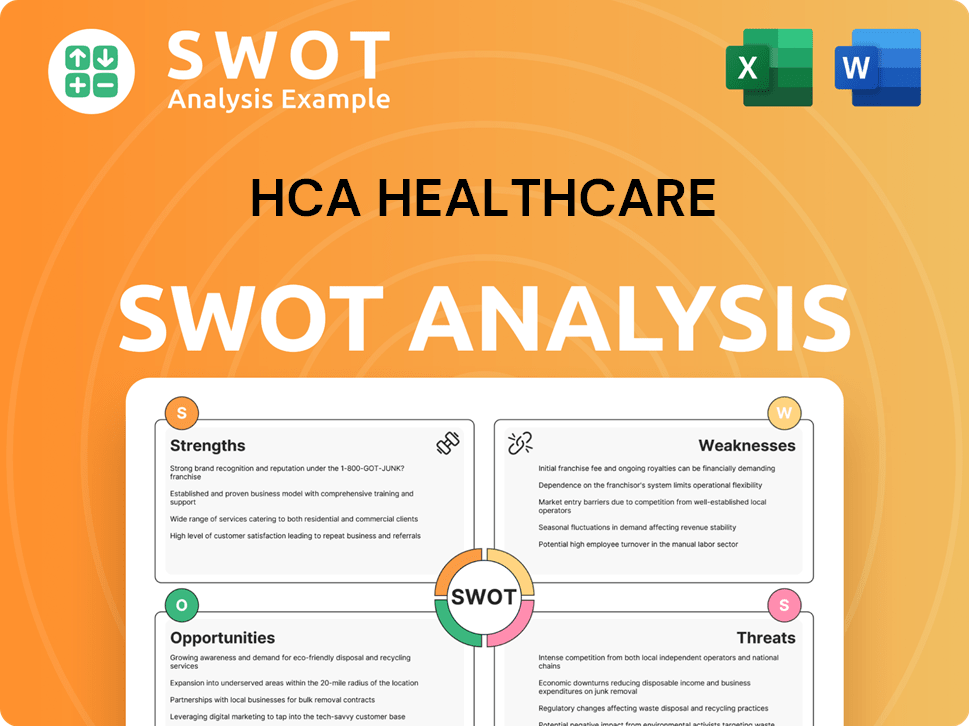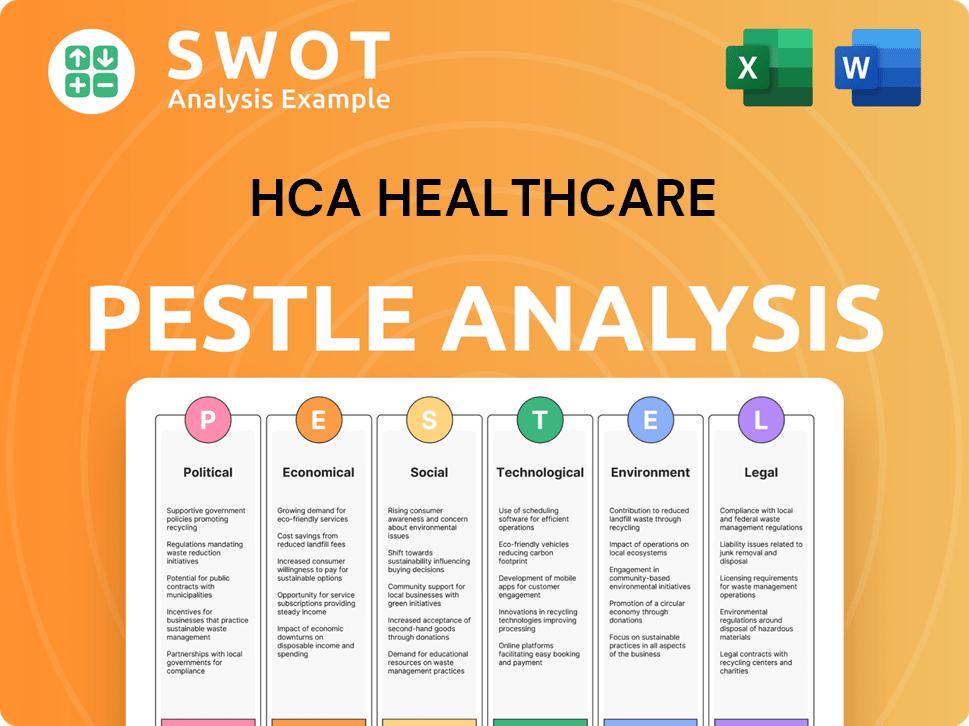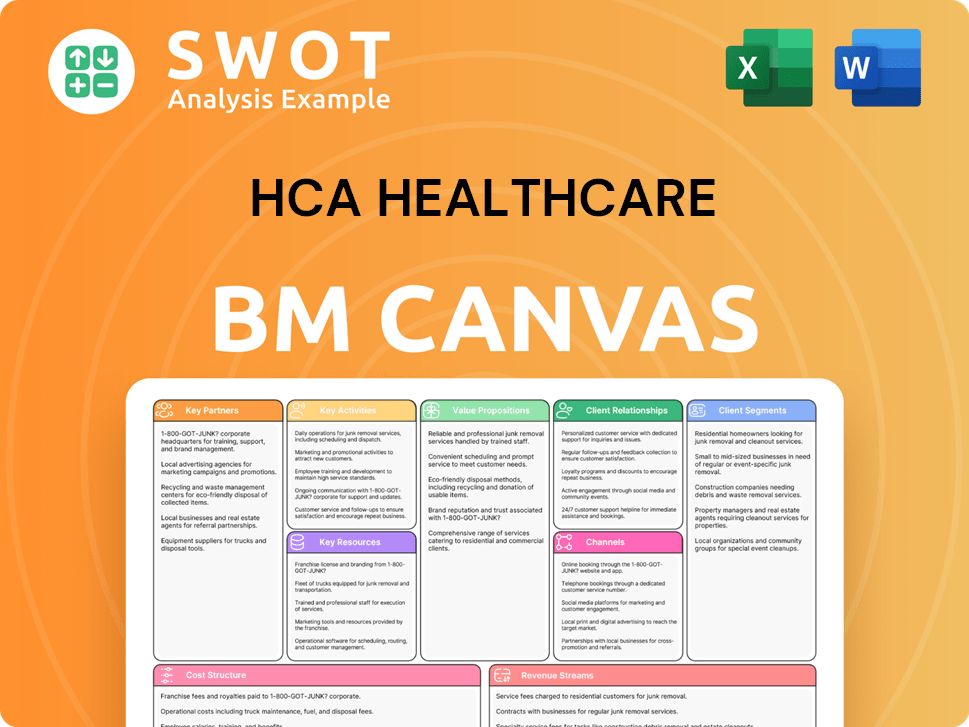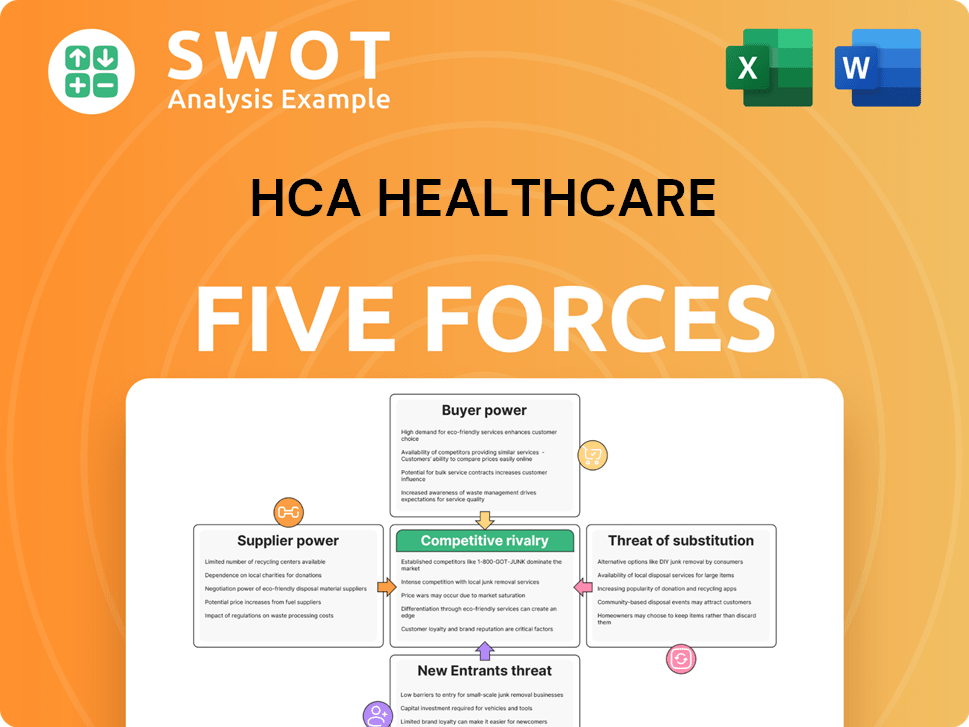HCA Healthcare Bundle
Who Really Controls HCA Healthcare?
Ever wondered who pulls the strings at one of the largest healthcare providers in the United States? HCA Healthcare, a titan in the industry, has a fascinating ownership story that has significantly influenced its strategic decisions. Understanding the HCA Healthcare SWOT Analysis is crucial to grasping the company's position in the market, its strengths, and potential vulnerabilities.

From its humble beginnings as Hospital Corporation of America, HCA Healthcare's journey through public and private ownership offers valuable insights into corporate governance. Examining the HCA ownership structure reveals the key players who shape its operations, from the C-suite executives to the institutional investors. This exploration will uncover the forces at play behind HCA Healthcare's financial performance and its impact on the healthcare landscape.
Who Founded HCA Healthcare?
The story of HCA Healthcare, formerly known as Hospital Corporation of America, began in 1968 in Nashville, Tennessee. The company was brought to life by a trio of founders, each contributing unique expertise to the venture. Their combined vision focused on uniting hospitals under one corporate structure to improve patient care and operational efficiency.
The founders of HCA Healthcare included Dr. Thomas F. Frist Sr., his son Dr. Thomas F. Frist Jr., and businessman Jack C. Massey. This partnership was a blend of medical knowledge and business acumen, setting the stage for the company's future growth. Their initial goal was to create a healthcare system that prioritized patient care while leveraging the advantages of a consolidated business model.
The company's foundation was built on Park View Hospital, founded by Dr. Thomas F. Frist Sr. in 1960. While specific details on the initial equity distribution are not publicly available, the collaboration between the Frists and Massey was crucial. This partnership combined medical expertise with business strategy, which was instrumental in the early stages of the company's expansion.
Dr. Thomas F. Frist Sr. was a physician and the founder of Park View Hospital.
Dr. Thomas F. Frist Jr., also a physician, was interested in business strategies.
Jack C. Massey was a successful businessman with experience in franchising.
The founders aimed to unite hospitals to improve patient care.
They planned to use collective resources to enhance hospitals.
The focus was on patient-first care and efficient management.
The founders of HCA Healthcare, including Dr. Thomas F. Frist Sr., Dr. Thomas F. Frist Jr., and Jack C. Massey, created a company with a strong focus on patient care and operational efficiency. Their combined expertise in medicine and business laid the groundwork for the company's growth. The early strategy of consolidating hospitals under one corporate umbrella, inspired by successful models like KFC, was a key factor in HCA Healthcare's initial success. The company's commitment to patient-focused care and efficient management remains a core value. For more insights into the company's strategic approach, consider exploring the Target Market of HCA Healthcare.
- HCA Healthcare was founded in 1968 in Nashville, Tennessee.
- The founders included Dr. Thomas F. Frist Sr., Dr. Thomas F. Frist Jr., and Jack C. Massey.
- Their initial focus was on patient-centered care and efficient hospital management.
- The company's early strategy was influenced by successful business models.
HCA Healthcare SWOT Analysis
- Complete SWOT Breakdown
- Fully Customizable
- Editable in Excel & Word
- Professional Formatting
- Investor-Ready Format

How Has HCA Healthcare’s Ownership Changed Over Time?
The ownership of HCA Healthcare, formerly known as Hospital Corporation of America, has seen significant shifts throughout its history. Initially founded in 1968, the company expanded rapidly through acquisitions, operating 349 hospitals by the end of 1981. A key early move was the 1987 spin-off of HealthTrust, a privately held entity. Subsequently, in 1988, HCA went private via a $5.1 billion leveraged buyout led by Thomas F. Frist Jr., believing its stock was undervalued.
HCA's journey continued with its re-emergence as a public company in 1992. A pivotal moment came in 1994 when HCA merged with Columbia Hospital Corporation, creating Columbia/HCA Healthcare Corporation. This merger, spearheaded by Richard Scott, positioned the combined entity as a national leader. Later, in November 2006, HCA once again became private through a $33 billion leveraged buyout involving private equity firms such as Kohlberg Kravis Roberts (KKR) and Bain Capital, marking one of the largest leveraged buyouts at the time. The company returned to the public market in March 2011, with an IPO valued at approximately $3.79 billion.
| Event | Year | Impact on Ownership |
|---|---|---|
| Founding of HCA | 1968 | Initial public offering |
| Leveraged Buyout | 1988 | Company goes private |
| Merger with Columbia Hospital Corporation | 1994 | Formation of Columbia/HCA Healthcare Corporation |
| Leveraged Buyout | 2006 | Company goes private |
| Initial Public Offering (IPO) | 2011 | Company goes public again |
As of 2025, HCA Healthcare is a publicly traded entity on the NYSE under the ticker HCA. Major institutional shareholders, including Vanguard Group Inc. and BlackRock, Inc., collectively hold a substantial portion of the company's shares. For instance, Vanguard Group Inc. held 15,751,569 shares, and BlackRock, Inc. held 13,902,082 shares as of March 31, 2025. The company has also implemented significant share buyback programs, such as repurchasing $6.04 billion of common stock in FY 2024, and an additional $10 billion share repurchase program authorized in January 2025, aiming to increase earnings per share. To understand more about the company's approach, you can read about the Marketing Strategy of HCA Healthcare.
HCA Healthcare's ownership structure has evolved significantly over time, transitioning between public and private ownership.
- The company has undergone multiple leveraged buyouts and IPOs.
- Major institutional investors hold a significant stake in the company.
- Share buyback programs are a key part of HCA's capital allocation strategy.
- HCA Healthcare's financial performance is closely watched by investors.
HCA Healthcare PESTLE Analysis
- Covers All 6 PESTLE Categories
- No Research Needed – Save Hours of Work
- Built by Experts, Trusted by Consultants
- Instant Download, Ready to Use
- 100% Editable, Fully Customizable

Who Sits on HCA Healthcare’s Board?
The current Board of Directors of HCA Healthcare, also known as Hospital Corporation of America, oversees the company's governance and strategic direction. The board includes a mix of independent directors and individuals with ties to the company's history and major investment groups. Sam Hazen serves as the Chief Executive Officer, and Thomas F. Frist III is the Chairman of the Board. For more details on the company's historical background, consider reading the Brief History of HCA Healthcare.
The composition of the board and its influence are crucial for understanding HCA Healthcare's operations. The board's decisions, including significant share repurchase programs, reflect a strategy focused on enhancing shareholder value, a key consideration for its institutional investor base.
| Board Member | Title | Affiliation |
|---|---|---|
| Sam Hazen | Chief Executive Officer | HCA Healthcare |
| Thomas F. Frist III | Chairman of the Board | HCA Healthcare |
| Various | Independent Directors | Various backgrounds |
HCA Healthcare operates under a one-share-one-vote structure, meaning voting power aligns with share ownership. Major institutional investors, such as Vanguard Group Inc. and BlackRock, Inc., hold substantial shares and thus wield significant influence through their voting rights on shareholder matters. As of the latest filings, there are no indications of arrangements granting outsized control to specific individuals beyond their equity holdings.
HCA Healthcare's board includes the CEO and Chairman, with a mix of independent directors. The company has a one-share-one-vote structure, ensuring voting power is proportional to share ownership. Major institutional investors hold significant influence through their voting power.
- The Board of Directors is responsible for governance.
- Voting power is based on share ownership.
- Institutional investors have significant influence.
- The company's financial performance is a key factor.
HCA Healthcare Business Model Canvas
- Complete 9-Block Business Model Canvas
- Effortlessly Communicate Your Business Strategy
- Investor-Ready BMC Format
- 100% Editable and Customizable
- Clear and Structured Layout

What Recent Changes Have Shaped HCA Healthcare’s Ownership Landscape?
In recent years, HCA Healthcare has prioritized returning capital to its shareholders through significant share buybacks and dividends. For example, in FY 2024, the company repurchased $6.04 billion of its common stock. This trend continued into 2025, with a new $10 billion share repurchase program authorized by the Board of Directors in January. During the first quarter of 2025 alone, HCA repurchased 7.762 million shares at a cost of $2.506 billion. This aggressive buyback strategy has led to negative stockholders' equity, which stood at -$3.164 billion as of March 31, 2025.
Simultaneously, HCA Healthcare has engaged in strategic mergers and acquisitions. In December 2024, HCA acquired Catholic Medical Center in Manchester, N.H., with the acquisition expected to close in the first quarter of 2025. However, the company's CEO, Sam Hazen, indicated in January 2025, that the focus would be on 'organic system development' rather than large inorganic growth opportunities. An example of divestiture is the sale of the Regional Medical Center in East San Jose, California, to Santa Clara Valley Healthcare for $150 million in April 2025.
Institutional investors hold a substantial portion of HCA Healthcare's shares, reflecting a trend towards increased institutional ownership within the healthcare industry. As of Q1 2025, institutional investors held approximately 61.92% of the company's shares. This high level of institutional ownership indicates confidence from major investment firms such as Vanguard and BlackRock. There have been no recent public announcements regarding changes in leadership succession or potential privatization, suggesting a continued focus on organic growth and shareholder returns.
The primary owners of HCA Healthcare are institutional investors, holding a significant portion of the shares. This includes firms like Vanguard and BlackRock. The company's focus remains on shareholder returns and organic growth strategies.
HCA Healthcare has been actively repurchasing its shares, with $6.04 billion in buybacks in FY 2024. A new $10 billion share repurchase program was authorized in January 2025. The company also engages in strategic mergers and acquisitions.
Recent acquisitions include Catholic Medical Center in Manchester, N.H., in December 2024. An example of divestiture is the sale of the Regional Medical Center in East San Jose, California, in April 2025.
The CEO, Sam Hazen, indicated a focus on organic system development. The company's strategy emphasizes shareholder returns and organic growth, with no immediate plans for leadership changes or privatization.
HCA Healthcare Porter's Five Forces Analysis
- Covers All 5 Competitive Forces in Detail
- Structured for Consultants, Students, and Founders
- 100% Editable in Microsoft Word & Excel
- Instant Digital Download – Use Immediately
- Compatible with Mac & PC – Fully Unlocked

Related Blogs
- What are Mission Vision & Core Values of HCA Healthcare Company?
- What is Competitive Landscape of HCA Healthcare Company?
- What is Growth Strategy and Future Prospects of HCA Healthcare Company?
- How Does HCA Healthcare Company Work?
- What is Sales and Marketing Strategy of HCA Healthcare Company?
- What is Brief History of HCA Healthcare Company?
- What is Customer Demographics and Target Market of HCA Healthcare Company?
Disclaimer
All information, articles, and product details provided on this website are for general informational and educational purposes only. We do not claim any ownership over, nor do we intend to infringe upon, any trademarks, copyrights, logos, brand names, or other intellectual property mentioned or depicted on this site. Such intellectual property remains the property of its respective owners, and any references here are made solely for identification or informational purposes, without implying any affiliation, endorsement, or partnership.
We make no representations or warranties, express or implied, regarding the accuracy, completeness, or suitability of any content or products presented. Nothing on this website should be construed as legal, tax, investment, financial, medical, or other professional advice. In addition, no part of this site—including articles or product references—constitutes a solicitation, recommendation, endorsement, advertisement, or offer to buy or sell any securities, franchises, or other financial instruments, particularly in jurisdictions where such activity would be unlawful.
All content is of a general nature and may not address the specific circumstances of any individual or entity. It is not a substitute for professional advice or services. Any actions you take based on the information provided here are strictly at your own risk. You accept full responsibility for any decisions or outcomes arising from your use of this website and agree to release us from any liability in connection with your use of, or reliance upon, the content or products found herein.